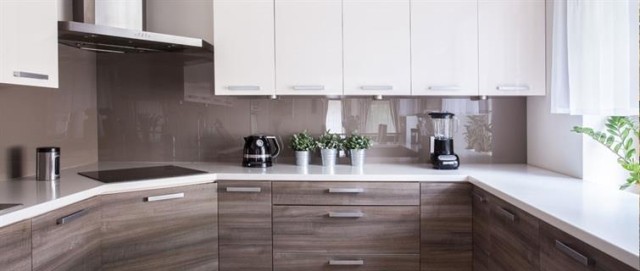Are you considering renting a house? Not sure where to start? Even though the process of renting a house is quite different from renting an apartment, as long as you end up in a home you love, that's what matters most. From the search process to what to look for (and what to watch out for), here are the steps to finding your perfect rental home.
Step One: Determine Your Budget.
The price for rental homes is varied and vast. You'll see everything from one-bedroom bungalows to duplexes to two-story, five-bedroom houses. When confronted with such diverse options, it's best to determine your budget before you start looking. The general rule of thumb for rent is at most 30 percent of your gross income. You will also need to factor in utilities (the bigger the house, the more it will cost to heat/cool it), pet fees if you have a pet, deposits, renters insurance, and moving-related expenses.
You may discover unexpected costs when renting a house. These expenses could include yard maintenance and equipment (lawn mower, shovel, rake), community or HOA fees, trash pick-up, and pest control. You'll want to ask the landlord what, if any, of these expenses are covered by your rent. Also, if the home doesn't have a washer/dryer, you'll have to purchase your own or drive to a coin laundry, so be sure to factor in those costs, as well.
Step Two: Know Your Credit Score.
If you need to know your credit score, now is the time to find out exactly where you stand. This number is critical. It isn't a deal-breaker – it is still possible to rent with bad credit or no credit, but it will be much more difficult, and it could require more money upfront or a guarantor.
Luckily, getting your score is easy. Go to annualcreditreport.com (the only government-mandated website and free to use) and get your score. The reason to do this before you start looking at rental properties is simple: knowing your score gives you peace of mind and time to prepare if your credit could be better. If it's excellent, it gives you some bargaining power. And if there are errors on your report, you can get them fixed before you get too far into the house-hunting process.
Step Three: Begin Your Search
Once you have determined your budget and credit score, it's time to find a house. Start by familiarizing yourself with the neighborhoods you would like to live in. If you've only rented an apartment until now, the areas could be different. For example, you may find more houses in the suburbs than in the city's heart or discover that these house-heavy neighborhoods are farther from shops and restaurants but closer to schools. Factor this in, along with commute times to and from work.
Once you've determined which neighborhoods you want to focus on, it's time to list what you need in a home rental. Do you require a fenced-in yard? Does the house have to be pet-friendly? How many bedrooms and bathrooms do you need? What about air conditioning? A garage? Make a list of your must-haves before you start looking. This way, you won't be swayed by that pricey four-bedroom when a two-bedroom house is all you need.
After determining your list of needs, start your search online at Apartments.com. On Apartments.com, you can enter your desired city or neighborhood and then use the filter "Type" to select houses. After that, put in your desired price range and how many bedrooms, bathrooms, and anything else you are looking for in your next home.
As you search, beware of rental scams. Once you know what to look for, these ads are easy to spot. Here are a few red flags:
- It's too good to be true: You see a gorgeous house in your desired neighborhood, and the rent is a fraction of all of the other rental homes in the area. Not slightly less, but significantly less. If the average rent for homes in that neighborhood ranges anywhere from $1,000-$1,500 and you see a house for $600, it might not be as great a deal as you think.
- The landlord claims he can't show you the property in person: If a landlord claims he is out of the country or makes up some wild story about why he can't meet you at the house for a tour of the property, that's a warning sign.
- You feel as though you are being rushed or pushed into "renting" the property: A legitimate landlord will take time to screen you, do a background check, and meet you in person. You will be living in a house they've invested money in, and they want to make sure you'll take care of the property, pay rent on time, and generally be a great tenant. If the landlord doesn't ask any questions, doesn't want to run a check on you, and doesn't even want to meet you, it's best to walk away from this potential scam.
- They ask you to wire money or hand over cash: If you haven't even seen the rental property and they are telling you they need cash upfront to hold the property, or they want you to wire money to them because they are "out of the country," it's likely a scam.
After looking at each house, create a list that fits your budget, location, and desired features. You'll want a backup or two in case you can't (for whatever reason) get your first choice. Once you've found some properties, you can contact the landlord and request a tour.
Step Four: Tour Your Favorites.
If you are looking at houses in another state, it might be difficult to tour the properties in person. Schedule the tours on the same day or over a two-day period and take a short trip. Or you can ask a landlord for a video or a virtual tour over a video call. Either way, you'll want to see the places for yourself and meet your potential landlord. If you're unable to take a short trip and the landlord won't provide you with a way to see the property virtually, have a close friend or family member take the tours for you.
During the tour, look at everything:
- Are there enough closets? Is there a coat closet? A linen closet? Walk-in closets in the bedrooms?
- Where are the outlets located?
- Is there a place to have Wi-Fi and cable?
- Are the bedrooms large enough?
- How is the layout of the living area?
- Is there a dining room? If not, is there a dedicated dining space?
- Is the kitchen large enough?
- Does the kitchen have enough counter space?
- Is there a pantry?
- Is there a dishwasher?
- Does the rental come with a washer/dryer? If not, are there hookups?
- Are there enough windows? How is the natural light?
- Is the yard fenced?
- Do you see (or smell) any signs of mold or water damage?
- Does the house look like it is well taken care of? (If not, this could be a sign of a non-responsive landlord)
- Is there a garage? If not, where are you able to park?
- Does the neighborhood have an HOA? If so, will you have to pay those fees, or are they included in the rent?
- Does the house have extra storage space (attic, basement, crawl space)?
- Does it have air conditioning? How old is the unit? Will the landlord be changing the filters?
- Are there enough smoke detectors in the house, and are they fully functional?
- Look at the ceiling. Are there any signs of leaks?
- Go ahead and peer under cabinets and behind sinks. Do you see any evidence of pests or rodents?
- Check your phone. Do you have service?
Try going back to the house during rush hour and driving your potential commute. This will be an eye-opening experience. You might have yet to notice the number of school zones or the tricky intersection when touring the house. Consider driving around on a Saturday afternoon, as well. You'll get a sense of the neighborhood. Is it family-friendly? Pet-friendly? Are neighbors out working in their yards or walking along the sidewalks? Making these observations will help you make your decision.
Step Five: Choose a Property and Ask Some Questions.
After touring properties, it's time to choose. It's very likely that one house stood out from the rest, and this is an easy decision. Before signing a lease, you need to ask a few more questions. You'll want to know how much money is required upfront (the security deposit, any application fee, pet fees, and possibly the first and last months' rent). Ask about the maintenance policy, the best way to contact the landlord, the guest policy, roommate policy, pet policy, and whether or not this is a long-term rental property. If you decide you want to renew your lease at the end of the term, this is crucial information. The landlord may be considering selling the house or moving into it at some point.
Ask the landlord about rent collection. Are online payments an option? If not, are you supposed to mail a check? Will the landlord come around once a month to collect in person? These are critical details that you'll want to know before signing a lease agreement. Be sure to ask about the payment due date, late fees, and on what day late fees are assessed. Also, if it isn't in the lease, ask how much notice you have to give before moving out, or will you be able to renew the lease if you choose to stay?
Are you allowed to decorate? Paint a room? Plant a garden? Have chickens? If you are interested in making any changes to the home inside or out (or acquiring non-traditional pets), be sure to ask about it now.
Step Six: Sign the Lease and Move In!
Read your lease carefully before signing it. A private landlord may not be familiar with all of the rental laws in the state. If you see something suspicious in the lease agreement, do some research before you sign – look up the laws yourself or contact a real estate lawyer. Once you sign, you have to abide by the lease agreement, so make sure you know what you are signing.
Now that your name is on the lease, it's time to move in! Make moving day a problem-free one by avoiding these 10 moving mistakes. Be sure to change your address, notify your friends and family if you haven't already, and start enjoying all of that extra space.






